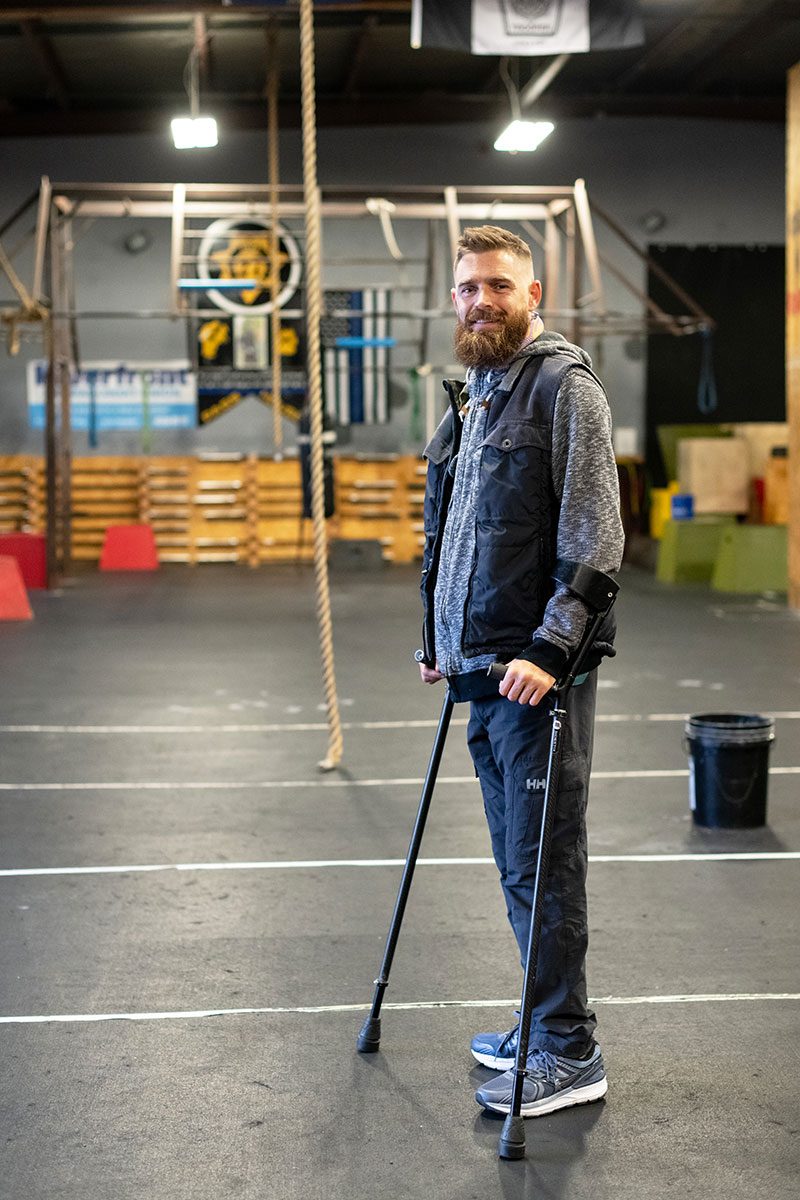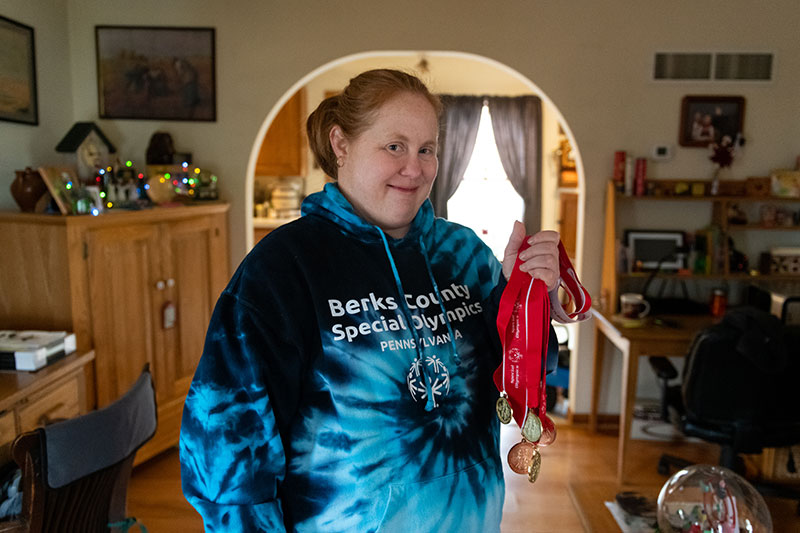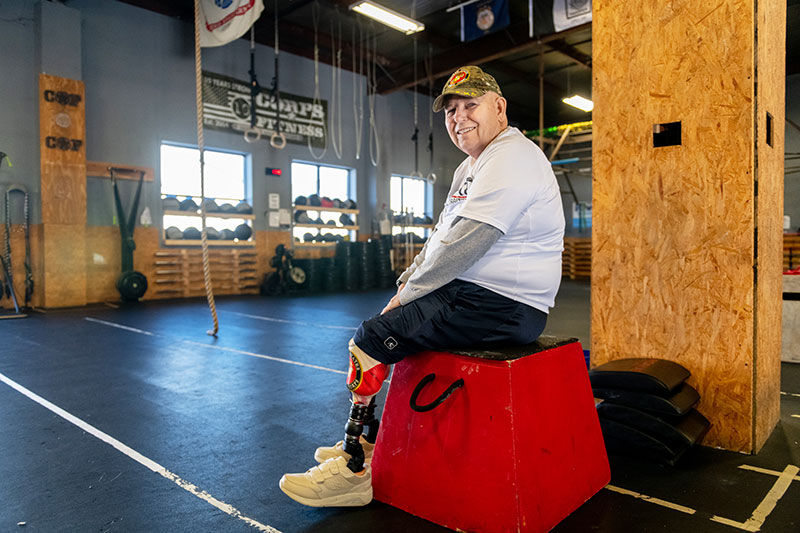No one’s life should be defined by what happens to them – either by birth or accident. People are capable of doing great things when they choose to believe in themselves, as these three individuals demonstrate. Their suggestions? Do the impossible; try your hardest; never give up, and don’t label yourself.

Brian Delozier
When it comes to labels, Brian Delozier, 34, doesn’t let his past injury define who he is today.
“I realized that I've been connecting so much of who I am to things that happened to me long ago, that it’s just become second nature,” Brian reveals.
For example, the Muhlenberg Township resident says, disabled or handicapped – or really anything to describe how his body or mind functions – aren’t really who he is.
“I'm so far from the person I was when I got hurt 18 years ago,” he says, explaining that he was injured in a skiing accident and broke two bones in his neck. One of the bones cut into his spinal cord, causing injury and the loss of function. “People are constantly asking me, ‘what happened?’ And I recite the same story from so long ago.”
Then they assume that it’s a sad story or think that the fact that he walks with crutches is the most difficult thing he deals with in life.
“I can understand that since it’s so easy to see, but it’s not something I think about anymore,” he says.
Brian, who turned his artistic pointillism hobby into a business, said his life and his injury are the opposite of a sad story.
“It’s a beautiful story, and through that accident I eventually gained more abilities than I lost,” he asserts. “So I can’t describe it as a disability.”
But it isn’t the physical side of life Brian has struggled with, and that’s been hard to verbalize.
“The most difficult thing I deal with [is] the emotional/mental aspect of life,” he says.
Brian says when he was younger, no one talked about mental health. As the conversation began, he started talking about it, too, and it was a release for him. He was later diagnosed with anxiety disorder and OCD, a diagnosis that made sense to him. But again, he didn’t want to describe himself by a diagnosis or with labels.
“Ultimately, beneath all these
labels, I'm a person who is alive right now and is just living and breathing and trying to do my best, trying to be a better person every day, trying to have more love and understanding for people, as well as myself,” he says.
One thing that Brian has found particularly helpful for physical and mental well-being is exercising.
“A few years ago, during a really difficult time in life, I stopped in to see Chris Kaag at IM ABLE,” he says. “That day, I also met Margaret, who has a very similar level injury as I do.”
It was an instant connection, and Brian remembers them immediately deciding to work out together.
“I really can’t describe how much of an impact this has had on my overall health,” he says. “Once I started seeing the work pay off – getting stronger, walking easier, and an overall sense of well-being – I’ve developed a passion for fitness, and it’s something I can’t live without.”
Seeing that hard work pay off has carried over into other aspects of Brian’s life.
“I’m learning with everything I want to achieve, that it takes a great deal of work and sacrifice,” he says.
But Brian believes that the community at IM ABLE is equal to the fitness.
“[I love] to be a part of that community – one that understands each other – and know we are all the same in there, with no labels,” he says, adding that he loves how everyone cares about and motivates each other.
“My advice to anyone who deals with any of these similar things would be to continue to find ways to be involved in life, getting up, moving,” he says. “Even on those really tough days…pushing through and staying determined, not feeling sorry for yourself. Difficulties and struggles are part of life; they can be used as a tool or an opportunity if you don’t back down from them but find ways to move forward and grow.”
All seriousness aside, Brian laughs and says he loves having a good time as well, and not taking things too seriously.
“My family and friends are very helpful for that,” he says. “Sometimes, we’ll even tell each other our problems and just laugh because we step back and realize that life is short, and in the big picture things are okay. That’s always a good thing.”

Katie L. Miller
While most people who know her would not have expected to see her speaking before large and small groups, Katie L. Miller, 41, says being a part of the Special Olympics changed her.
“I was always quiet and shy through my school years,” Katie, who has Mosaic Down’s Syndrome, explains. “I have always enjoyed competition, though, and Special Olympics has given me an opportunity to bring out my competitive nature and to make many friends I never would have met.”
Volleyball was the first sport to draw Katie, of North Heidelberg Township, to the Special Olympics of Berks County in August 2008.
“I was looking for more social interaction and to compete in a sports situation,” she says.
From there, Katie began competing in other sports. Then in 2014, she started doing work as a Global Messenger for the Special Olympics. Her formal training for becoming the official Global Messenger and Athlete Representative began in 2015.
The training, provided by the Pennsylvania Special Olympics, took until 2018 to complete, and Katie says she attended with her father and mentor, Stephen Miller. The Athlete Leadership Program was led by Jordan Schubert and Chelsea Drob, fellow Special Olympians, parents, and state staff.
“They did a great job in teaching and guiding by example,” she says.
Katie attended two weekend-long sessions in Indiana County and Lebanon County for Global Messenger training. The Athlete Representative training was held in Harrisburg and Lancaster County.
“Each were long sessions held on Saturday and Sunday,” she recalls.
But Katie says she went to the courses/training because she felt she could represent Special Olympics of Berks County athletes by speaking at events about the program and how it helps participants.
“The training programs were long and challenging, but they really upgraded my communication and leadership skills,” she says. “I am more confident in speaking before groups, and I actually look forward to doing it.”
Her last assignment was to give formal remarks on behalf of Special Olympics at the Division III Women’s Collegiate Field Hockey banquet held for the Final Four teams the night before the championship competitions.
“I enjoyed it very much, and I believe my message was well-received,” she says.
Katie continues to participate in sports with the Special Olympics of Berks County. The list is extensive and includes volleyball, bocce, aquatics and softball. She previously competed in floor hockey, basketball and soccer.
“My favorite sports are volleyball and soccer,” she says, adding that her mom says her best is swimming.
Sports are a true favorite among Katie’s hobbies. In high school, she was the statistician for the girls’ basketball team, and she threw shot put on the track team. She says she’s an avid college basketball fan keeping up with her favorite team, Duke University. She’s also a diehard Denver Broncos fan.
“I follow both Duke and the Broncos and keep up-to-date on their stats,” she says. “I also watch and keep detailed notes on the entire NFL Draft. I watch the NBA Draft closely, too.”
But her life isn’t all about sports. She said she enjoys detailed coloring, shopping, video games, as well as using her iPad and helping her dad split wood. She also works at Prospectus Berco in Reading and volunteers her time, helping teachers at Conrad Weiser West Elementary School.
Katie works hard and lives a full life, and it all comes back to what she’s learned from her participation with Special Olympics.
“I really think our athlete oath is central to our organization: Let me win. But if I cannot win, let me be brave in the attempt,” she says.

Michael Anthony "Tony" Petro
For Tony Petro, founder of AMPUTEES ON THE MOVE!, getting back on his feet was a literal challenge.
During his time serving in the Marine Corps in Vietnam, Tony, 71, says he was unknowingly exposed to Agent Orange every day for 13 months.
“We had no idea what this defoliant was capable of doing,” the Exeter Township resident says. “We found out the hard way 30 years after service, when we started experiencing all kinds of medical problems.”
In January 2012, Tony lost his left leg due to circulation problems.
“The effect this has had on my life…at times I can’t wrap my head around it,” he shares.
But Tony says he proudly drew on his Marine training to get himself back on his feet, and, as he relearned how to walk, he knew that his life would never be the same.
“At first, I really struggled with my new normal, but I decided that this was not going to define who I am,” he says.
After about five years of good health, Tony lost his right leg.
“Along with the loss of my leg I had to deal with more health issues,” he says. “Right after my leg surgery, I had a heart attack. This whole thing set me back a bit, and I wasn’t sure which way was up.”
While he was in his hospital bed, Tony took inventory of where he was at that point in his life. With the loss of both legs and recovering from his heart attack, he knew that he had a hard choice to make.
“I figured I had two options: one was to do nothing and feel sorry for myself and wind up in a nursing facility, or [I] get up and find out what I needed to do to get my life back,” he says.
Tony says he chose the latter and got on his way.
Over four years ago, as a member of an area amputee support group, several members came to him, unhappy about how the group was being operated.
“They asked me if I could give them an alternative to this group,” he says.After investigating what could be done, Tony came up with an idea.
“As people have limb amputations, they feel that they have now become freaks and can no longer do the things they used to do,” he explains. “I felt that we could fill that gap by showing them they were not freaks and that they could do everything they used to do before their amputations.”
Thus, Tony created a non-profit group called AMPUTEES ON THE MOVE! as a way to help the amputee community see how they can lead a “normal” life. The group provides a venue to safely do whatever they want.
“Our motto is: ‘What do you want to do today?’” he says, adding that that includes activities like golfing, bowling, bicycling, scuba diving and swimming. “We also provide many other services including education. We have a GoFundMe account to raise funds for needy patients.”
Tony says that ever since he started this organization, he has had his eyes opened to the needs of people in the amputee community.
As part of the group’s monthly activities, they made a visit as a group to the IM ABLE Foundation in Wyomissing, resulting in Tony beginning to work out with a personal trainer at the facility.
“The IM ABLE Foundation was instrumental in my recovering from the loss of my legs,” he says. “There is no doubt in my mind the trainers that I worked with were powerful in my success, as was my wife, Sandy, a rock for me to lean on. Without her help I would not be here today.”
Having a limb amputation is a very traumatic event, Tony admits. There is no way to prepare for it.
“The best I can tell [people] is that, first of all, make sure you are properly healed,” he says. “You must then talk to people, preferably someone from the amputee community, about what your options are.”
He suggests that amputees reach out to the Amputee Coalition of America, because they have answers to all your questions.
“Then after you have your new prosthetic, come and pay us a visit,” he says. “We’ll help you back on your feet.”















